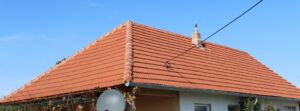Researchers from the Karlsruhe Institute of Technology in Germany found that more than 50% of Europe’s 41 million freestanding homes could have been self-sufficient in 2020`s. Using just solar and batteries, this figure is expected to rise to 75% in 2050.
Off grid in next decade
Even in 2050, their results show that going off-grid won’t be the most cost-effective option. However, if we are willing to pay more for self-sufficiency, it might make sense to invest in these types of buildings. This claim dr Max Kleinebrahm, the lead researcher and an energy economics researcher at the Karlsruhe Institute of Technology.
“It would be less efficient to have a large number of households abandoning the grid rather than supporting it.” say dr Kleinebraham.
A study in the scientific journal Joule called “Two million European single-family homes could abandon the grid by 2050” went into more detail about the research.
Foof roops have to have main role
A study found that more than 30 million homes in Europe could get all the energy they need from solar panels on their roofs.
Because solar technology is getting better, it will also become cheaper for some of these single-family houses that are not connected to the power grid in the next few decades.
Although some people might want to disconnect from the grid, the researchers said that it would be better for households to stay linked and send extra energy to other users when there is too much.

You can quickly and easily calculate what you can get from your roof on SOLAR PANEL ANGLE CALCULATOR
Solar panels prices is falling
The cost of solar power has dropped by almost 90% in the last decade, according to estimates made in September by the Mercator Research Institute on Global Commons and Climate Change (MCC) in Berlin. The price of solar panels has dropped by a lot – in recent years.
According to lead researcher Felix Creutzig, the world’s energy needs could be “completely and cost-effectively covered by solar technology and other renewables” in 2050 because prices are going down.
Another study, this one from the University of Exeter and University College London and released last month, said that solar energy has hit a “irreversible tipping point” that will make it the world’s main source of power in thirty years.
About main researchers
The Chair of Energy Economics at the Karlsruhe Institute of Technology in Germany is where Max Kleinebrahm does his PhD work. In his study, he is interested in renewable energies, decentralized energy systems (analysis and modeling), energy-selfsufficient residential buildings, and time-series analysis of how people use energy and behave. For his PhD, he is looking into how self-sufficient domestic buildings will be used in Europe’s future energy system and what effects this will have. His current study is focused on getting a better understanding of the relationships between technology and economics on the supply side and between sociodemographics and demand on the demand side. This will help him make better predictions about how energy-efficient buildings will spread. From January 10th to March 27th, 2020, he is doing research at the University of Reading with Mate Janos Lorincz, Jose Luis Ramirez-Mendiola, and Professor Torriti. They are working on simulating how people behave in their own homes to learn more about how much energy people actually need.


